

"The General Principles of Sufism," by Shah, Sirdar Ikbal Ali. The Hibbert Journal, Vol. XX, October 1921/ July 1922. "Part VI, Sufism". The Sufi message, Volume IX—The Unity of Religious Ideals - han, Inayat. I One of the words to which the term 'Sufi' is related is the Greek Sophia, meaning wisdom; wisdom is the knowledge acquired from within and without.
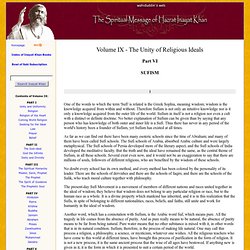
Therefore Sufism is not only an intuitive knowledge nor is it only a knowledge acquired from the outer life of the world. Sufism in itself is not a religion nor even a cult with a distinct or definite doctrine. No better explanation of Sufism can be given than by saying that any person who has knowledge of both outer and inner life is a Sufi. Sufism. Sufism (or taṣawwuf; Arabic: الصوفية) is a branch of Islam,[1] defined by adherents as the inner, mystical dimension of Islam; others contend that it is a perennial philosophy of existence that pre-dates religion, the expression of which flowered within Islam.[2] Its essence has also been expressed via other religions and metareligious phenomena.[3][4][5] A practitioner of this tradition is generally known as a ṣūfī (صُوفِيّ).

Sufis believe they are practicing ihsan (perfection of worship) as revealed by Gabriel to Muhammad: "Worship and serve Allah as you are seeing Him and while you see Him not yet truly He sees you". Sufis consider themselves as the original true proponents of this pure original form of Islam. Sufism is opposed by Wahhabi and Salafist Muslims.
The Sufi Message: VOLUME IX - 30. THE WORD Message in itself conveys a different meaning from that of an intellectual philosophy.
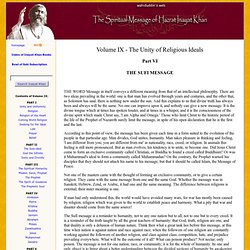
There are two ideas prevailing in the world: one is that man has evolved through years and centuries, and the other that, as Solomon has said, there is nothing new under the sun. And this explains to us that divine truth has always been and always will be the same. No one can improve upon it, and nobody can give a new message. The Spirit of Sufism VOLUME IX - 32. Sufism cannot be called a religion, because it is free from principles, distinctions, and differences, the very basis on which religions are founded; neither can it be called a philosophy, because philosophy teaches the study of nature in its qualities and varieties, whereas Sufism teaches unity.

Therefore it may best be called simply the training of the view. The word 'Sufi' implies purity, and purity contains two qualities. Pure means unmixed with any other element, or in other words that which exists in its own element unalloyed and unstained. Al-Ghazali. Abū Ḥāmid Muḥammad ibn Muḥammad al-Ghazālī (c. 1058–1111); (ابو حامد محمد ابن محمد الغزالي), known as Al-Ghazali or Algazel to the Western medieval world, was a Muslim theologian, jurist, philosopher, and mystic of Persian descent.[5] Al-Ghazali has sometimes been referred to by historians as the single most influential Muslim after the Islamic prophet Muhammad.[6] Within Islam he is considered to be a Mujaddid or renewer of the faith, who, according to tradition, appears once every century to restore the faith of the community.[7][8][9] His works were so highly acclaimed by his contemporaries that al-Ghazali was awarded the honorific title "Proof of Islam" (Hujjat al-Islam).[1] Others[who?]

Life[edit] Haruniyah (هارونیه) structure in Tus, Iran, named after Harun al-Rashid, the mausoleum of Al-Ghazali is thought to be situated at the entrance of this monument School affiliations[edit] Works[edit] Al Ghazali - The Alchemist of Happiness - Documentary Trailer. The Islamic Texts Society. Resources for the study of Islam. Partial Booklists by ITS. Muslim Communities of Grace: The Sufi Brotherhoods in Islamic Religious Life - Jamil M. Abun-Nasr. Medicine of the Prophet (Islamic Texts Society) by Ibn Qayyim al-Jawziyya. Review of Medicine of the Prophet, by A. H. L. Holdijk. Translating Sufism. The Fethullah Gülen Movement in Thought and Practice- Gülen's Interpretation of Sufism. Gülen’s Interpretation of Sufism Dogan Koc University of Houston Gulen and the movement named after his name has become an interest subject of social scientists in the West.
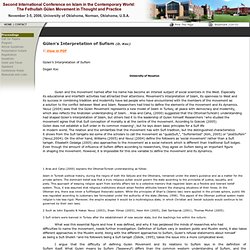
Especially its educational and interfaith activities had attracted their attentions. Movement’s interpretation of Islam, its openness to West and its success in combining tradition and modernity have led people who have encountered with the members of the movement as a solution to the conflict between West and Islam. 1 Aras and Caha (2000) explains the OttomanTurkish understanding as follow: The Nimatullahi Sufi Order. The Heritage of Sufism: Classical Persian Sufism from its Origins to Rumi (700-1300) (Volume I) by Lonard Lewisohn. Letters from a Sufi Teacher. Early Islamic Mysticism: Sufi, Qur'an, Mi'raj, Poetic and Theological Writings by Michael Anthony Sells.
Idries Shah - The Sufis.o. Tafseer Holy Quran from all Tafseer Schools, Quran Translations, Quran Recitations, Quran Interpretation (Tafseer), Quran Sciences, and Love In Quran. The Middle East Center. Georgetown University - Islamic Studies - LibGuides. Cornell University Library: Islamic religion. Islamic Medical Manuscripts: Prophetic Medicine 1. A Note on Prophetic Medicine In addition to the Greek-based medical systems advocated by physicians such as al-Rāzī and Ibn Sīnā (Avicenna), there was also an alternative genre of medical writing called al-ṭibb al-nabawī, or 'The Medicine of the Prophet' or 'Prophetic Medicine'.
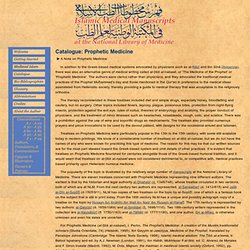
The authors were clerics rather than physicians, and they advocated the traditional medical practices of the Prophet Muḥammad's day and those mentioned in the Qur'an in preference to the medical ideas assimilated from Hellenistic society, thereby providing a guide to medical therapy that was acceptable to the religiously orthodox. The therapy recommended in these treatises included diet and simple drugs, especially honey, bloodletting and cautery, but no surgery. Treatises on Prophetic Medicine were particularly popular in the 13th to the 15th century, with some still available today in modern printings.
Dervish. A Dervish or Darvesh[1] (from Persian درویش, Darvīsh[2] via Turkish,[3] Somali: Daraawiish, Arabic: درويش, Darwīš) is someone treading a Sufi Muslim ascetic path or "Tariqah", known for their extreme poverty and austerity.
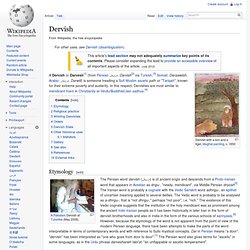
In this respect, Dervishes are most similar to mendicant friars in Christianity or Hindu/Buddhist/Jain sadhus.[4] Etymology[edit] The Persian word darvīsh (درویش) is of ancient origin and descends from a Proto-Iranian word that appears in Avestan as drigu-, "needy, mendicant", via Middle Persian driyosh[5] The Iranian word is probably a cognate with the Vedic Sanskrit word adhrigu-, an epithet of uncertain meaning applied to several deities. The Vedic word is probably to be analysed as a-dhrigu-, that is "not dhrigu-," perhaps "not poor", i.e.
"rich. " Religious practice[edit] A dervish. Many Dervishes are mendicant ascetics who have taken a vow of poverty, unlike mullahs. Dargah. The Dargah of Haji Ali, in Mumbai.
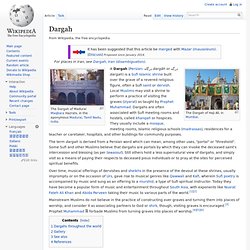
A Dargah (Persian: درگاه dargâh or درگه dargah) is a Sufi Islamic shrine built over the grave of a revered religious figure, often a Sufi saint or dervish. Local Muslims may visit a shrine to perform a practice of visiting the graves (ziyarat) as taught by Prophet Muhammad. Dargahs are often associated with Sufi meeting rooms and hostels, called khanqah or hospices.
They usually include a mosque, meeting rooms, Islamic religious schools (madrassas), residences for a teacher or caretaker, hospitals, and other buildings for community purposes. The term dargah is derived from a Persian word which can mean, among other uses, "portal" or "threshold".